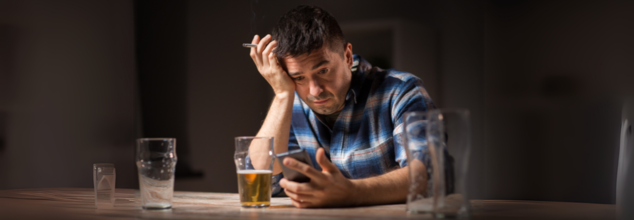
Does Hangover Worsens with Age? (Credit: Canva)
Is Drinking Water A Real Hangover Cure? 4 Remedies To Rehydrate And Recover
You’ve been there before: waking up to a pounding headache, dry mouth, and an overwhelming sense of regret from the night before. As you sit up, clutching your head, you wonder, “Why did I drink so much?” We’ve all had those mornings when the aftermath of alcohol hits hard.
The usual go-to remedy is to chug water and hope for the best. But according to recent studies, that long-standing belief may not be as effective as we think.
For years, many have believed that staying hydrated is the key to avoiding or curing a hangover. The logic makes sense: alcohol dehydrates the body, so rehydrating should, in theory, reduce or prevent the symptoms. However, research from Utrecht University in the Netherlands challenges this notion. Studies found that dehydration is not the sole cause of hangovers, meaning that drinking water has a limited impact on the body’s recovery.
In a series of studies, researchers tracked the symptoms of individuals who drank water before bed compared to those who didn’t. While those who stayed hydrated felt less thirsty the next day, they experienced the same level of pain, nausea, and exhaustion as those who hadn’t. The conclusion? Drinking water might ease the dry mouth and thirst, but it does little to alleviate the more significant hangover symptoms like headaches, nausea, and fatigue.
Cause of Hangovers
So, if dehydration isn’t the main culprit, what is? According to experts like Dr. Johnny Parvani, founder of REVIV, a hangover is caused by a combination of alcohol metabolism and dehydration. When alcohol is metabolized in the body, it creates byproducts that trigger oxidative stress and inflammation, both of which contribute to the misery of a hangover.
Dr. Joris Verster, lead author of the Utrecht University study, simplifies it: “The more you drink, the more likely you are to get a hangover.” While hydration may help alleviate some symptoms, it doesn’t address the inflammation and oxidative stress caused by alcohol. Hangovers and dehydration, the research concludes, are co-occurring but separate consequences of excessive drinking.
Does Hangover Worsens with Age?
To make matters worse, hangovers tend to intensify as we age. As we grow older, our liver function declines, our body composition changes, and we retain less water. This leads to a higher concentration of alcohol in the bloodstream and a harsher hangover the next morning. While there’s no surefire remedy, being mindful of how much and how quickly we drink can make a difference.
What Really Helps? 4 Hangover Remedies
While there isn’t a scientifically proven hangover cure, some remedies can help ease the discomfort. Here are a few tried-and-tested methods:
1. Eat Bland, Carbohydrate-Rich Foods: To ease nausea, eating bland foods high in carbohydrates is recommended. Foods like bananas, rice, applesauce, toast, and crackers can help settle an upset stomach. Avoid greasy or heavy meals that may worsen nausea.
2. Rehydrate Gradually: While drinking water might not prevent a hangover, it’s still crucial to rehydrate after a night of drinking. Sip room-temperature water slowly rather than gulping it down to avoid upsetting your stomach further. Sports drinks, coconut water, and electrolyte-infused drinks can help restore your body’s balance of fluids and electrolytes.
3. Ginger for Nausea: Ginger is well-known for its anti-nausea properties. Sipping ginger tea or chewing on dried ginger can soothe your stomach and help ease hangover-related nausea.
4. Get Some Rest: Sleep is one of the best remedies for a hangover. If possible, allow yourself more time to rest and recover. Your body needs time to heal from the inflammation and oxidative stress caused by alcohol.
How To Prevent Hangover?
While hangovers are common, they aren’t inevitable if you take precautions. Here are some strategies to help prevent hangovers:
- Drinking at a slower pace allows your body more time to metabolize alcohol, reducing the severity of a hangover.
- Drinking on an empty stomach is a surefire way to worsen a hangover. Eating a substantial meal beforehand helps slow the absorption of alcohol into your bloodstream.
- Drinking a glass of water between alcoholic drinks can help reduce dehydration and slow down your alcohol intake.
- For women, the recommended alcohol limit is no more than one drink per day, while men should stick to two. Knowing and respecting your limits can go a long way in preventing a nasty hangover.
Hangovers are never fun, but they’re a reminder of the body’s limitations. While drinking water might help with some symptoms, it’s not the cure-all many of us believe it to be. The real key to preventing and easing hangovers lies in moderation, staying mindful of your alcohol intake, and giving your body the rest and nourishment it needs to recover.
So next time you find yourself in the throes of a hangover, be patient—recovery is just a matter of time.

Image Credits: Canva
Can Probiotics Really Help Ease Symptoms Of Autism?
Autism spectrum disorder (ASD) is a complex neurodevelopmental disorder affecting social interaction, behavior, and communication. The etiology of autism is yet to be deciphered, although there is burgeoning evidence that an intimate relationship between the gut microbiome and the brain exists. In recent times, researchers have been investigating the possibility of using probiotics—the so-called "good bacteria"—as therapeutic interventions in children with autism. These supplements not only enhance digestive health but also reduce some of the behavioral symptoms, bringing hope to millions of families around the globe.
ASD is highly variable in its signs and symptoms. Some children have speech and communication problems, whereas others have sensory sensitivity or repetitive behaviors. Most have a problem with emotional regulation and social communication. Less openly spoken is that kids with autism very often have gastrointestinal (GI) problems like bloating, constipation, diarrhea, and irritable bowel syndrome (IBS).
Research has shown that people with autism tend to have an imbalance of their gut microbiota, with less healthy bacteria and more pathogenic bacteria like Clostridia. This has prompted scientists to study if normalization of the gut through probiotics would help improve symptoms of ASD.
Role of Probiotics in Gut Health
Probiotics are live bacteria and yeasts that are beneficial to the digestive system. They are present in fermented foods such as yogurt, kefir, kimchi, and miso, and also in dietary supplements. Probiotics assist in keeping the good and bad bacteria in the gut in balance. These good microbes enhance digestion, boost the immune system, and can lower inflammation—factors that may contribute to autism symptoms.
Increased numbers of studies now indicate that probiotics may provide an effective complimentary treatment for individuals with ASD. In a more recent study revealed by the BMJ Journal, it was identified that children consuming probiotic supplements noticed a reduction of 47.77% in behavioral signs. The trial further indicated an attenuation of social withdrawal by 40% as well as the rate of repetition reduced by 37.77%. Further, enhancements in gastrointestinal well-being were observed, such as a rise of 18.18% in formed stools and a decrease of 6.66% in watery stools.
The Autism-Gut-Brain Connection
The brain and the gut are closely linked by the gut-brain axis, a two-way communication network between the nervous system and the digestive system. The US Department of Health and National Institutes of Health (NIH) place significant importance on gut microbiota in postnatal brain development. Scientists feel that alterations in gut bacteria can be responsible for neurological and behavioral abnormalities in children with autism.
Ohio State University Study links kids with ASD were noted to have lower amounts of Faecalibacterium prausnitzii, a gut bacterium linked to good gut health.
Another research stated that how chemicals made by gut bacteria affect autism behaviors.
A 2016 International Meeting for Autism Research (IMFAR) detected Haemophilus parainfluenzae in the stools of autistic children, tying it to gastrointestinal distress and behavioral difficulties.
Based on this evidence, numerous scientists now think that enhancing gut health with probiotics may help ease symptoms of autism.
Probiotics and Digestive Health in Autism
Individuals with autism have a higher tendency to experience GI disorders like IBS and leaky gut syndrome, which results when toxic bacteria and toxins escape into the blood through a weakened intestinal lining. Leaky gut symptoms can be:
- Constipation
- Bloating
- Excess gas
- Nutrient deficiencies
- Food allergies
By restoring the balance of gut flora, probiotics can potentially treat these gastrointestinal disturbances. Probiotic strains including Lactobacillus acidophilus, L. rhamnosus GG, L. reuteri, and Bifidobacterium have been effective in maintaining intestinal health and relieving symptoms of children with inflammatory bowel disease (IBD), a condition typically observed in children with ASD. Saccharomyces boulardii, a probiotic yeast, has also been reported to be responsible for the relief of obsessive-compulsive behaviors, which are characteristically observed in children with autism.
How to Choose the Right Probiotic for Autism?
When choosing a probiotic supplement for an autistic child, parents need to take the following into account:
Strain Diversity: A variety of bacterial strains is best for maintaining gut health.
Scientific Support: Opt for probiotics that have scientific evidence, like Lactobacillus and Bifidobacterium species.
Live Cultures: Make sure the product has active, live bacteria that can withstand stomach acid and travel to the intestines.
Consultation with a Physician: Always consult with a physician prior to the initiation of probiotics, particularly for children with weakened immune systems.
Although probiotics are regarded as safe, side effects can be in the form of slight gas, bloating, constipation, or allergic reactions. Nevertheless, these are generally tolerated as the body acclimatizes to the new bacterial load.
Are Probiotics a Safe and Effective Treatment for Autism?
The US Food and Drug Administration (FDA) oversees probiotics as foods, not as drugs, so their efficacy and safety are not under the same level of intense testing as pharmaceuticals. However, experts in the health field are unanimous in saying that probiotics are safe for children as well as adults when used properly.
Although probiotics cannot be considered a sole treatment for autism, they can be used to augment current therapies like behavioral therapy, speech therapy, and special education programs. Stool analysis can also be used to identify the most appropriate probiotic strains for a child's individual needs so that a customized approach to gut health can be adopted.
Autism can be difficult to handle by families, but research on the gut-brain relationship provides new promise. While researchers keep finding the connection between gut health and neurological function, probiotics can become the hoped-for component in the overall treatment of autism.
Improvements in microbiome science, as well as greater knowledge of probiotics, are a giant leap toward enhancing the quality of life in ASD-affected children. Although larger clinical trials are necessary to delineate the role of probiotics in autism treatment comprehensively, the early results are promising. Parents willing to use probiotics for the child should visit a healthcare practitioner to decide on the most suitable method for their child's specific requirements.

Image Credits: Kennedy News & Media
Ohio Woman’s Routine Manicure ‘Saved Her Life’- How A Nail Discoloration Turned Out To Be Skin Cancer?
A regular manicure became a lifesaver for 58-year-old Michelle Tagliamonte of Centreville, Ohio. What appeared to be a minor cosmetic issue—a strange black line on her thumbnail—proved to be an early warning sign of melanoma, one of the most dangerous types of skin cancer. Her experience highlights the value of being attentive to changes in your body and seeking medical advice when things do not feel right.
Tagliamonte, like many others, had a regular beauty routine. She visited a nail salon every four weeks for a manicure, a routine she followed without much thought. Yet, at the time of her last September visit, she noticed something odd—thin black lines on her right thumbnail. She initially dismissed it, thinking that nothing was wrong.
"I typically get my nails done every four weeks, so I don't know how long it had been there," she remembered. "But my nails grow pretty quickly because I have really good nutrition. It could have been there for six months or longer."
She snapped photos of the lines and went on with her nail appointment, unaware that this apparently insignificant detail was an indicator of something much more severe.
As the weeks went by, Tagliamonte observed that the lines did not extend out with her nail as she had anticipated. Rather, they stuck at the base of her thumbnail and appeared to be getting deeper. By the time her next appointment arrived, the marks persisted—unchanged and unerased.
That was the wake-up call. Not taking any chances, she went to see a doctor. Over Thanksgiving, the results revealed her worst fears—the black lines were evidence of melanoma, stage zero or 'melanoma in situ.'
What is Stage Zero Melanoma?
Stage zero melanoma, or 'melanoma in situ,' is a situation where the cancer cells remain in the epidermis and have not extended beyond it. Although it is the most treatable and earliest stage, it can become invasive melanoma, spreading to other regions of the body and threatening life, if it goes undiagnosed.
Physicians moved quickly to eliminate the cancerous cells before they had a chance to disperse. On January 17, Tagliamonte received a four-hour surgical procedure in which physicians amputated her entire thumbnail. To reattach the damaged area, a skin graft was conducted using tissue from the rest of her thumb.
The dermatologist noticed discoloration at the bottom of my nail," she said. "Whatever was producing this black line was originating from within the growth plate, way down deep inside my nail.
The procedure was invasive and complicated. The melanoma extended down to the first knuckle of her thumb, and a considerable amount of tissue had to be removed. The exposed bone and tendon were covered with the skin graft to allow the area to heal. Although she permanently lost her thumbnail, Tagliamonte is thankful for the timely medical intervention that left her alive.
Tagliamonte attributes her routine manicure sessions and her own vigilance for detecting the disease before it advanced to a more serious phase.
"The nail appointment definitely saved my life," she stressed. "I am thankful that I noticed it and then went about having it checked out."
Her experience is an eye-opener that even slightest changes in the body, whether seemingly innocuous, can prove to be signals of major illness at times. She now prefers others to be alert and hearken to instincts.
If you notice something unusual or different, listen to your own instincts and have it looked at," she warned. "If I'd have ignored it, Lord only knows what might have happened to me in the future."
Hidden Dangers of Nail Health and Exposure to the Sun
Tagliamonte's account also makes one mindful of other health hazards of nail care. Numerous individuals are not aware that dark or black stripes in the nails can be markers of hidden underlying medical conditions. At times, such markings could be a consequence of a disorder known as subungual melanoma, an infrequent yet malignant form of skin cancer beneath the nail.
Moreover, experts caution against the dangers posed by the UV lamps that are employed in certain professional manicures to harden gel nail polish. Such machines release UVA rays, which penetrate deep into the skin, heightening the risk of skin cancer with extended exposure.
"Too much exposure to UV light can harm the DNA of skin cells, causing them to grow out of control and form tumors," say dermatologists. "UVA and UVB radiation both help cause skin cancer, though UVB is more directly responsible for sunburn, with UVA causing more long-term harm and hastening the skin's aging process."
Uncommon Signs of Melanoma
Although melanoma is usually linked to moles and skin lesions, Michelle Tagliamonte's situation featured a number of uncommon warning signs:
Black Stripes on the Nail – Rather than a visible skin lesion, she saw dark stripes along her thumbnail, a less common symptom of subungual melanoma.
No Discomfort or Pain – Most people expect cancerous tumors to be painful, but Michelle felt no pain, making the diagnosis even more surprising.
Slow and Steady Growth – The streaks did not fall out or simply grow out with her nail, an indication that there was something amiss.
Concealed Source – The melanoma was growing from the growth plate of the nail underneath, hence hidden at first.
Stage Zero Diagnosis – Despite the alarming signs, the melanoma was actually in its earliest stage, illustrating how intervention at this point could avoid fatal effects.

Image Credit: Canva
Ophthalmologist Warns You Can Go Blind, If You Do Not Quit 'Smoking & Drinking'
Have you ever considered how your daily routines affect your vision? While we all link smoking and drinking to lung disease or liver damage, their impact on eye health is commonly disregarded. But these habits may be quietly stealing your vision.
Imagine this: You smoke a cigarette or have some cocktails after work, having no idea that the behaviors are speeding along the development of such conditions as cataracts, macular degeneration, and even blindness. Research indicates that smokers are four times more likely to have age-related macular degeneration (AMD), the most prevalent cause of vision loss. At the same time, excessive drinking removes vital nutrients that promote healthy eyes, causing blurry vision, optic nerve damage, and an increased risk of cataracts.
According to Dr. Ajay Sharma, top ophthalmologist, "The toxicants present in cigarette smoke have the potential to irreversibly damage sensitive eye tissues, and alcohol misuse speeds up vision loss in the long run.
The best news? Saving your eyesight begins with knowledge. Knowing how smoking and drinking affect your vision is the beginning of making better decisions. So go ahead, reach for that next drink or cigarette, and ask yourself: Is it worth risking your eyesight? Let's take a look at the true effect of these habits on your eyes.
We hear plenty about the ill effects of smoking and heavy drinking when it comes to heart disease, lung diseases, and liver disease. Their effects on the eyes, however, are much less talked about. Our eyes, just like all other organs, are prone to harm brought about by these bad habits. Smoking brings with it poisonous chemicals that damage crucial eye structures, and heavy drinking causes nutritional deficiencies and nerve damage, both of which have severe effects on the eyes.
Effects of Smoking on Eye Health
1. Risk of Blinding Eye Diseases
Smoking is a significant risk factor for several diseases that can lead to blindness, including:
Cataracts: Cigarette smoke releases toxic chemicals that speed up oxidative stress, which causes clouding of the lens of the eye. Research indicates that smokers are twice more likely to develop cataracts than non-smokers. Ophthalmologist Dr. Ajay Sharma says, "The harmful substances in cigarette smoke directly harm the lens, and there is a greater chance of cataract formation at an earlier age."
Age-Related Macular Degeneration (AMD): The macula, the retina's central region, which is used for clear vision, degenerates as a result of chronic smoking. Smokers are up to four times more likely than non-smokers to develop AMD, according to research. This condition progressively blurs central vision, making ordinary activities like reading and identifying faces more difficult by the day.
Glaucoma and Optic Nerve Damage: Smoking leads to high eye pressure, weakening the optic nerve and risking glaucoma. "The long-term eye effects of smoking are grave and irreversible, which is why quitting smoking as early as possible is very important," Dr. Sharma adds.
2. Dry Eye Syndrome and Increased Tear Reduction
Smoking interferes with tear production and quality, causing chronic dry eye syndrome. The symptoms are redness, irritation, and discomfort. The cigarette smoke exposure also increases inflammation, which makes it hard for the eyes to stay moist.
3. Diabetic Retinopathy Aggravation
For diabetics, smoking also aggravates diabetic retinopathy, a disease that destroys blood vessels in the eye. This will result in progressive visual impairment, further emphasizing why diabetics should eschew smoking.
Effects of Alcohol on Eye Health
1. Nutritional Deficiencies Leading to Vision Impairment
Long-term drinking drains vital vitamins and nutrients needed for eye health, especially:
Vitamin A Deficiency: Causes night blindness and dry eyes.
B-Complex Deficiency: Compromises optic nerve function, which raises the risk of vision loss.
Zinc Deficiency: Compromises retinal function, lowering clarity and contrast sensitivity.
Excessive alcohol consumption impairs the body's capacity to absorb these vital nutrients, hastening the loss of eye health.
2. Alcohol-Induced Optic Neuropathy
Alcohol abuse may lead to toxic optic neuropathy, which is a condition that involves blurred vision, impairment in color perception, and progressive vision loss. Chronic excessive drinking destroys the optic nerve over a period of time, causing permanent vision loss.
3. Transient and Permanent Blurred Vision
Whereas frequent drinking of alcohol may temporarily cause blurred vision through dehydration and insufficient oxygen flow to the eyes, long-term abuse of alcohol can result in sustained vision complications such as double vision and limited peripheral vision.
Yes, smoking and excessive drinking for many years can result in permanent vision loss. As Dr. Sharma points out, "Smokers are much more likely to get cataracts and age-related macular degeneration, both of which will result in permanent blindness if untreated."
Smoking-related eye disease symptoms are:
Cataracts: Dull vision, blurred color vision, and difficulty with vision in low light.
AMD: Altered or absent central vision, trouble reading, and trouble with identifying faces.
The initial phases of such conditions usually show no signs and symptoms, so frequent eye examinations are essential for early detection and treatment.
Stopping Smoking and Cutting Down Alcohol Consumption
The silver lining is that quitting smoking and cutting down on alcohol intake will substantially reduce the chances of eye-related ailments. Research indicates that people who quit smoking find their eye diseases to progress gradually. On the same note, having moderate alcohol intake and following a balanced diet can safeguard long-term eye health.
Important Steps to Safeguard Your Vision:
- Stop smoking to lower the chance of cataracts, AMD, and optic nerve damage.
- Restrict alcohol use to avoid optic neuropathy and preserve vital vitamins.
- Eat a balanced diet filled with vitamin A, B-complex vitamins, and antioxidants for healthy vision.
- Have regular eye exams to detect and treat vision issues early on.
Dr. Ajay Sharma, Ophthalmologist, Founder and Chief Medical Director of Eye-Q Eye Hospitals in India
© 2024 Bennett, Coleman & Company Limited

